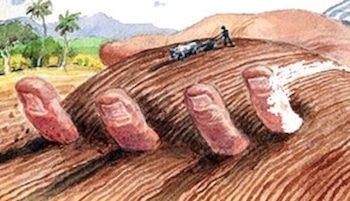Railroad giant Union Pacific has some big plans for a tiny Texas community. According to locals in the Brazos River Valley, the railroad company is hoping to turn some of the most fertile farmland in Texas into a massive, 72-line rail yard.
Union Pacific’s plan would consume as much as 1,800 acres of farmland in the region, effectively putting numerous family-owned farming operations out of business. The toxic loads that Union Pacific’s trains would be hauling in and out of the area on a daily basis would then threaten the remaining farms in the region.
The Brazos River Valley, named after the Brazos River, is considered some of the richest farmland in the state, thanks to the city’s namesake river feeding fresh water and nutrients to the area. Taking this land out of the hands of farmers — many of whom are the descendants of early generation of farm settlers in the area — would not only have devastating effects on the local economy, but they could also put a huge hole in the nation’s food supply.
But Union Pacific is not concerned with the well being of the Brazos Valley community or their environment, and they are hoping to move forward with their plan. And the land grab only represents half of the danger.
According to a letter from the Brazos River Bottom Alliance that was sent to state and federal representatives, there will be no environmental review of the project:
Despite the enormous impact of this UPR project, no environmental review of its proposed siting will be required, and no consideration will be given to reasonable, available alternative sites. The Federal Surface Transportation Board (STB) is the regulatory agency with jurisdiction over railroad siting matters. Recently, the STB declined to exercise approval authority over this UPR project in Robertson County, even though the BRBA had petitioned the agency to exercise such authority and undertake a review. It appears that the STB exercises its approval authority based on certain project types and not on the project’s far-reaching impact on land use, landowners, small business owners, and the environment—and impact is generally one consideration to trigger federal jurisdiction and oversight (such as pursuant to the National Environmental Policy Act).
Moreover, railroad regulation is an area that is exclusively given to federal oversight. States are unable to regulate railroads because they will be ‘pre-empted’ by federal law. As a result, we have been unable to use state laws to fight critical aspects of the UPR project, such as the siting, in a way that ensures a reasonable resolution is reached.
The biggest threat from the proposed rail yard is inside the rail cars themselves. An email received from Public Citizen in Texas spells out the danger:
The rail yard would accommodate stepped up exports of coal, petroleum coke and oil out of the Port of Houston and other ports along Texas’s Gulf Coast. With the expansion of the Panama Canal, the ports are expected to increase exports by about 35 percent by 2030. Texas-based Kinder Morgan has already expanded two of its Houston coal export facilities, and the rail yard would allow Union Pacific to double its coal exports.
Heavier coal train traffic would affect cities and towns far from the 72-track rail yard. Coal trains, often as long as a mile, carry coal in uncovered piles. Along their routes, each one generates hundreds of pounds of airborne coal dust, which the EPA has said is a probable carcinogen. Coal trains are prone to derailment, because of coal dust build-up along the tracks.
The cause for concern in the area is very real. Railway accidents in the United States are increasing at alarming rates as more and more trains are used to transport coal and oil. As Sharon Kelly pointed out earlier this year on DeSmogBlog, oil train accidents hit a peak in 2013.
An oil or coal accident in this fragile, yet fertile, farm region could easily destroy a sizable portion of Texas’s arable land.
The big question that remains unanswered is why Union Pacific is even able to make such a bold proposal — a proposal that would give the company eminent domain over swaths of land that have been privately owned for more than a century. The answer lies in the company’s bank account.
Union Pacific is considered a “heavy hitter” by OpenSecrets.org because they are a top campaign donor and lobbying group in Washington, D.C.
During the 2012 election cycle, the company spent more than $2 million in direct campaign contributions on top of $5.6 million in lobbying that year. For 2013, they spent more than $3 million on lobbying. As a result, they have powerful friends in powerful places that have helped the company move forward without the necessary environmental reviews or any regard for the local landholders.
It is hard to imagine a scenario in which Union Pacific doesn’t get their way, which is very disturbing. But as long as the residents within the Brazos River Valley continue to fight back, they might just be strong enough to stop this horrendous plan from making it out of the planning stages.
Subscribe to our newsletter
Stay up to date with DeSmog news and alerts







